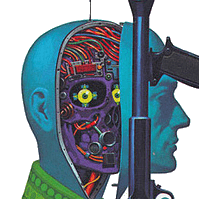Liberalism is not necessarily capitalist. It is possible to be an anti-capitalist liberal by recognizing the inalienable right to workplace democracy @technology
I don’t think that’s true, at least not given the classical definition found here on Wikipedia. In general, I think John Locke embodies liberalism really well, and he believed in a natural right to life, liberty, and property. So to me, property has been a foundational part of liberalism since its creation.
Then again, a lot of people use “liberal” to essentially be the same as “leftist,” meaning anyone left of center. But I think that’s silly, because in my eyes and using the academic definition of liberalism, both the Democratic Party and Republican Party have strong liberal roots, and they’re different in where they deviate from that (Democrats are weak on property rights and free markets, Republicans are weak on civil liberties and secularism).
If you’re anti-capitalist, by definition you’re not a liberal IMO. And I think most people who claim to be anti-capitalist aren’t actually anti-capitalist (can’t speak for you though), they’re just frustrated at our corrupted form of capitalism. A purer form of capitalism (less protectionism, i.e. fewer IP protections, fewer options to limit liability, etc) accompanied with a healthy safety net (e.g. something like UBI) and worker protections is probably more than adequate to most who espouse anti-capitalist sentiment.
It is exactly people’s right to property that rules out capitalism. The principle behind property is getting the positive and negative fruits of your labor. The capitalist employer-employee relationship has the employer appropriating 100% of the positive and negative fruits of workers’ labor while employees receive 0% of the property rights to the produced output and liabilities for the used-up inputs. The only way for workers to get the fruits of their labor is in worker coops @technology
No, the way for workers to get the fruits of their labor is to not sell their labor, but instead sell the fruits of their labor. Worker coops are one way to do that, or they can become independent contractors. Both of those are capitalist, since the only real requirement for capitalism is for property ownership to be owned by an individual or small group, not collectively. A coop is essentially the same thing any other corporation, but the workers are the shareholders. There’s still a well-defined system of exclusive ownership of the means of production (i.e. the workers become capital owners).
But a lot of people don’t actually want that. Owning your own business (or having a share of your business) means taking on a lot of risk. If times get hard, your income takes a big hit because you’re absorbing the risk. If the venture fails, that capital disappears.
That’s why a lot of people prefer to sell their labor, they like the consistent paycheck. If the company loses money, they still get paid at their agreed-upon rate, or they lose their job and find a job elsewhere. It’s the same reason why a lot of people prefer to rent instead of owning their own property, they don’t want the risk associated with capital ownership. I create more value for my company than I earn, and that’s 100% okay because I’m looking for stability (I have a wife and kids), so I’d rather someone else get the rewards for hustling than have the stress of having to do that myself. I tried contracting for a few years, and that all ended when COVID happened and all of my clients disappeared. So now I’m content selling my labor and getting stability in return.
If worker coops are what you want, then you’re not anti-capitalist, you’re just against selling your labor and are comfortable taking on some risk. That’s completely valid in a capitalist society, and you have every right to start or join a coop. If you’re okay with labor unions, then you mostly just want to empower workers to get more leverage over their employers to force them to have thinner margins (but they’ll still need to be compensated for the risk). If you’re truly anti-capitalist, you wouldn’t be satisfied with coops or unions since those are capitalist systems.






